SEO managers are responsible for developing the strategy to improve a website’s search visibility and organic traffic. But what exactly do they do? What skills and qualifications do they need? And how can you become one?
To find out, I looked through 52 SEO manager job listings on LinkedIn and asked a few actual SEO managers.
Sidenote.
I only focused on job descriptions that asked for “SEO manager.” That means no “SEO account manager,” “technical SEO manager,” and the like. (Though job listings for Senior SEO Managers were included.)
The most common responsibilities I found were:
- Develop SEO strategy (100%)
- Collaborate with other teams (96.15%)
- Identify new SEO opportunities (88.46%)
- Make SEO recommendations (76.92%)
- Report to stakeholders or create reports (76.92%)
- Keep up-to-date on SEO trends and updates (76.92%)
- Develop SEO tests (32.69%)
Sidenote.
Given that it would have been impossible to check each listing for hundreds of potential responsibilities, I got ChatGPT to help. I gave it ten job posts from the list and asked it to identify the most common responsibilities. I then went through all 52 listings and checked how common each responsibility was.
It seems that an SEO manager’s job largely revolves around management (who knew!?). They might have some responsibility for implementing changes, writing content, or building links themselves, but it’s not their primary thing. They tend to collaborate with and rely on other teams to get things done.
I reached out to a few SEO managers who (mostly) echoed this:
It’s more common for me to collaborate with other teams.
For the most part, I’ll provide strategic direction and recommendations to clients which they will then implement. I’ll collaborate with different teams (e.g. content managers, developers, etc.) to ensure we’re aligned and happy with the actions. There are some edge cases where I’ll get more hands-on (e.g., updating metadata, adding internal links), but most of the value in my roles lies in the strategy!
When it comes to content, I’m lucky enough to be surrounded by a team with a wide range of expertise. I’ll generally be the one to scout topic or title opportunities before directing it to the most suitable team member. Regarding technical SEO & onsite changes; if it’s something that can be done within our CMS then I’ll go ahead and do it. Anything hard-coded or things like speed tweaks or fixing CLS then I’ll brief the changes in with the dev team.
At NOVOS, we operate mostly on a consultancy basis. This means that we’re recommending changes for SEO, but instead of implementing, we work with our client’s tech teams and marketing teams to have our recommendations implemented.
I also asked which of their responsibilities take up the most of their time.
Here’s what they said:
I would say both collaborating with other teams and reporting to stakeholders. Some people are very tech and market-savvy, some are not 🙂 so it takes time.
Within my role it’s a bit of a combination of collaboration across other departments keeping things aligned, as well as identifying and building new strategies to ensure all our clients are kept at the forefront of search.
On the whole, the majority of my time is spent identifying SEO opportunities and developing recommendations to achieve them. But it varies a fair amount depending on the client/website. Some clients will want more comprehensive reporting and more regular meetings, whereas others want to get our recommendations and get on with it.
In general, most of my time is spent analysing data to guide our strategy. This might be backlink analysis on a competitor, working through search query data on Search Console or looking at index reports to see how search engines are interacting with our pages.
For my role, there is a definite split between team management and client focussed work. I would say when it comes to working with clients, identifying new opportunities and communicating with the client are the most prominent areas that I work with.
I’d say working out the strategy & developing it on-going is what takes up most of my time, followed by the preparation for different client meetings.
It really depends, but usually at the beginning of each month reporting on each client, preparations for the monthly meetings with the clients take a bit of time. On Monday-Tuesdays I usually focus on site health checks and then the rest of the week is meetings, BAU tasks, working on strategies, reviewing work/helping others, etc.
Here are the common skills I saw:
- Data analysis and interpretation (84.62%)
- Strong communicator & collaborator (80.77%)
- Experience with SEO tools (80.77%)
- Programming – e.g., HTML, CSS, JavaScript (50%)
- Project management (48.08%)
- Entrepreneurial, self-starting spirit (25%)
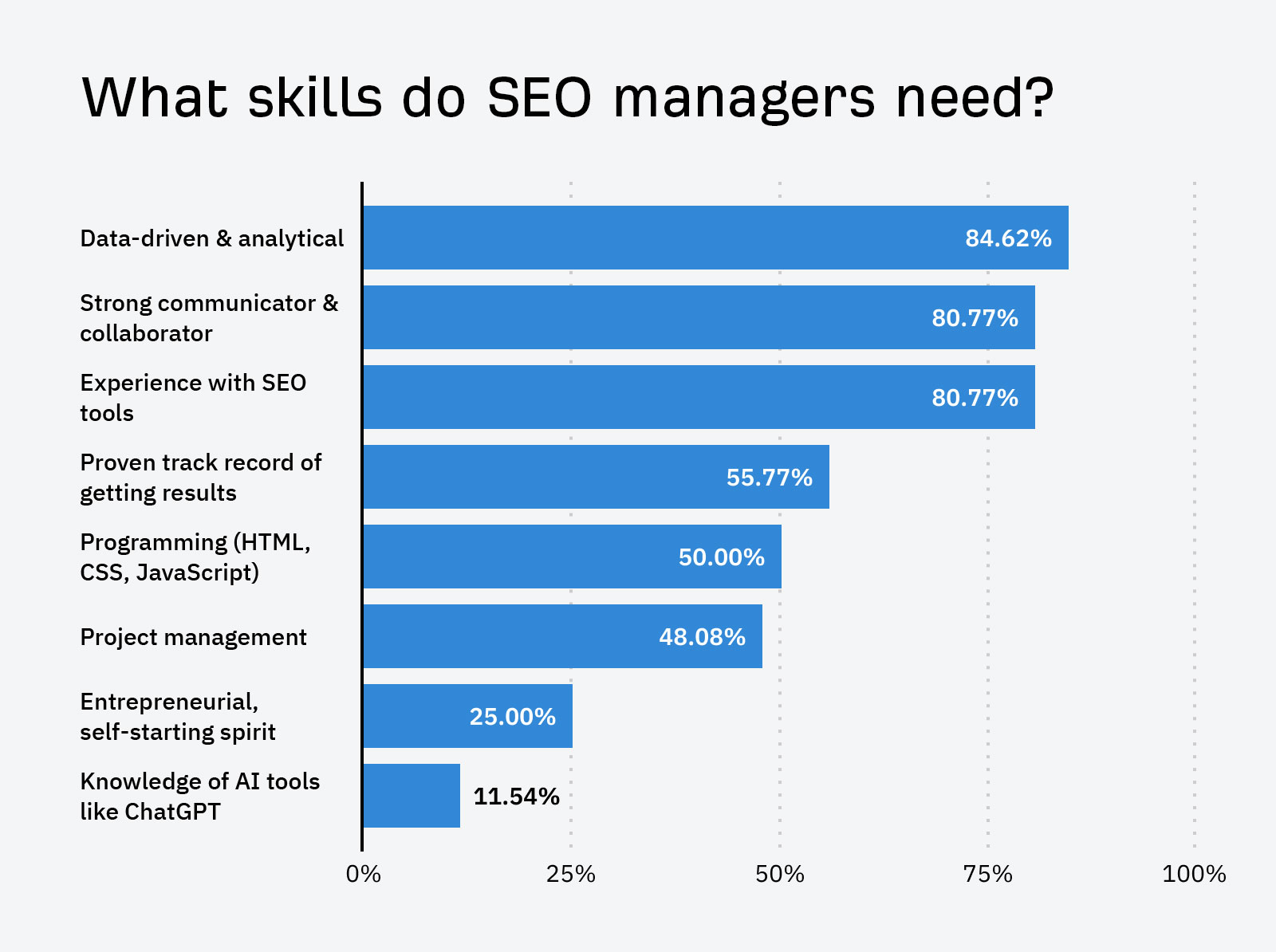
Sidenote.
I enlisted ChatGPT’s help to answer this question, using the same methodology as before.
I also asked a few SEO managers what they think is the most important skill for their position. Here’s what they said:
I’d say that bigger picture thinking/long term vision is super important. In SEO, it’s so easy to get bogged down in fine details when putting together a strategy, so it’s vital to know how to prioritise tasks in a roadmap and figure out what makes most sense to tackle first from a wider business perspective.
I think some of the most important skills in SEO are the “soft skills”. Being inquisitive and able to pivot quickly is key as rankings, guidelines and algorithms can all change overnight.. and often do! Alongside that, having clear communication skills is important for securing buy-in from stakeholders, and educating other departments how their actions tie into wider SEO strategy.
For me, it has got to be strong communication and awareness. Without this things can easily go missed and with SEO being such a rollercoaster at times, this provides clarity across what is happening from an business point of view as well as from a larger SEO & Google view.
I think that empathy and emotional intelligence are the most important skills in my role. The foundation of SEO expertise and being data-driven is of course important, but I do think that my ability to relate to people has helped me to grow in this role.
While there are so many important qualities, like being a good listener, and being helpful and honest, I’m going to stick with being resilient. Sure, one can solve a problem, work out a strategy that works, or know how to talk to clients, but if you don’t follow through, if you don’t stay consistent, that mindset won’t lead to success as an SEO manager.
I think you should definitely have an analytical mindset, sometimes you just need to turn the logic on and your issue is sorted. Communication skills are very important too, not just when you work with other teams or people within your team, but also clients. Attention to details can’t go unnoticed – one little thing can take a turn of events.
Here are a few more interesting observations from the data:
- 55.77% wanted applicants to have a proven track record of SEO success.
- Of those who asked for experience with SEO tools, 54.8% asked for experience with Ahrefs.
- 11.54% wanted applicants with knowledge of AI tools like ChatGPT.

I asked a few SEO managers whether they consider knowledge of AI tools to be important for their position. Here’s what they said:
Considering it’s all anyone has been talking about for the last year or so, I’d say it’s pretty important! Jokes aside, I think there’s been so much noise about AI tools over the last year that sometimes the benefits for SEOs may be slightly exaggerated or seen as a “silver bullet”, when actually their use cases are still pretty specific.
I think everyone in SEO should hold some knowledge of how AI tools are being used and how they obtain and serve their responses.
I think it’s definitely a bonus as it can really save you time on some areas such as writing HTML code but would still need to be checked over manually.
Yeah, it’s important. ChatGPT came in handy for both monotonous (e.g., meta description, ALT text in bulk) and complex (Python script for a specific task; you need to have programming knowledge though to verify) SEO tasks.
There was a pretty even split here, with just over half (53.8%) of listings requiring applicants to have a degree.
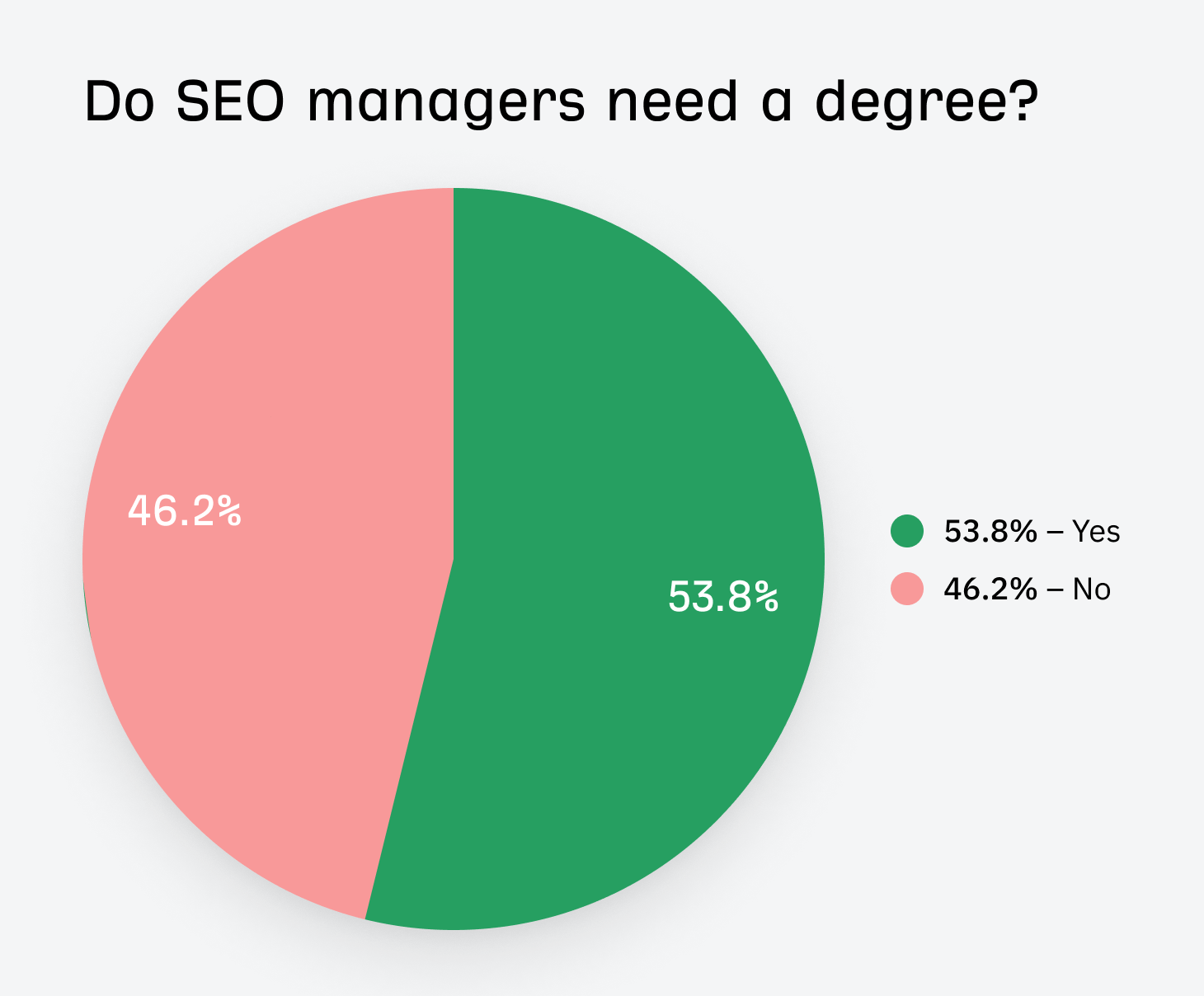
None of those who required a degree asked for anything higher than a bachelor’s degree, but the majority (80%) do ask for a degree in a related field like marketing, business, advertising, or computer science.

I asked a few SEO managers whether they felt a degree was important for their role. Here’s what they said:
My degree was in modern languages, so I wouldn’t say it is “important” to my role. But it’s definitely helpful on some occasions, for example if I’m working on a multilingual website and performing tasks such as competitor analysis, keyword research or content ideation in other languages.
As someone who doesn’t have a degree; I’d say it’s definitely not important! So much of the job is about testing, trial and error, and incremental gains. There’s been an increase in the number of digital marketing and adjacent degrees in recent years, which I’m sure are great, but I don’t think anything beats hands-on experience when it comes to SEO.
I don’t have a degree. I think in something such as SEO which is so fast paced and ever changing, it’s more important to gain experience and be within the industry constantly pushing and testing methods.
Not really. The main things that I got from my degree was independence and drive – but my degree shockingly barely covered any online marketing options.
In terms of actual knowledge, not really. I graduated in 2018, having studied Marketing and Advertising and some core concepts that I’ve learned stayed relevant but one could easily learn the same things from an online YouTube video. I barely did any *real* practical work during my classes and had to self-study most things.
Definitely a no 🙂 I did study digital marketing modules as part of my degrees but we never went deep about SEO or any other channel really. When I was hired first as a graduate I was learning about SEO and how it works from the very beginning. LinkedIn courses, online articles and videos, personal diggings, people I worked with, my managers’ experiences taught me all I know today.
Yeah, I have a bachelor’s in computer science and am currently pursuing my M.S. in marketing.
None of the job listings asked for SEO certifications.
Both agencies and companies hire SEO managers, but the data suggests that it’s most commonly an in-house position. Only 10.7% of the job listings I analyzed were for roles in agencies.
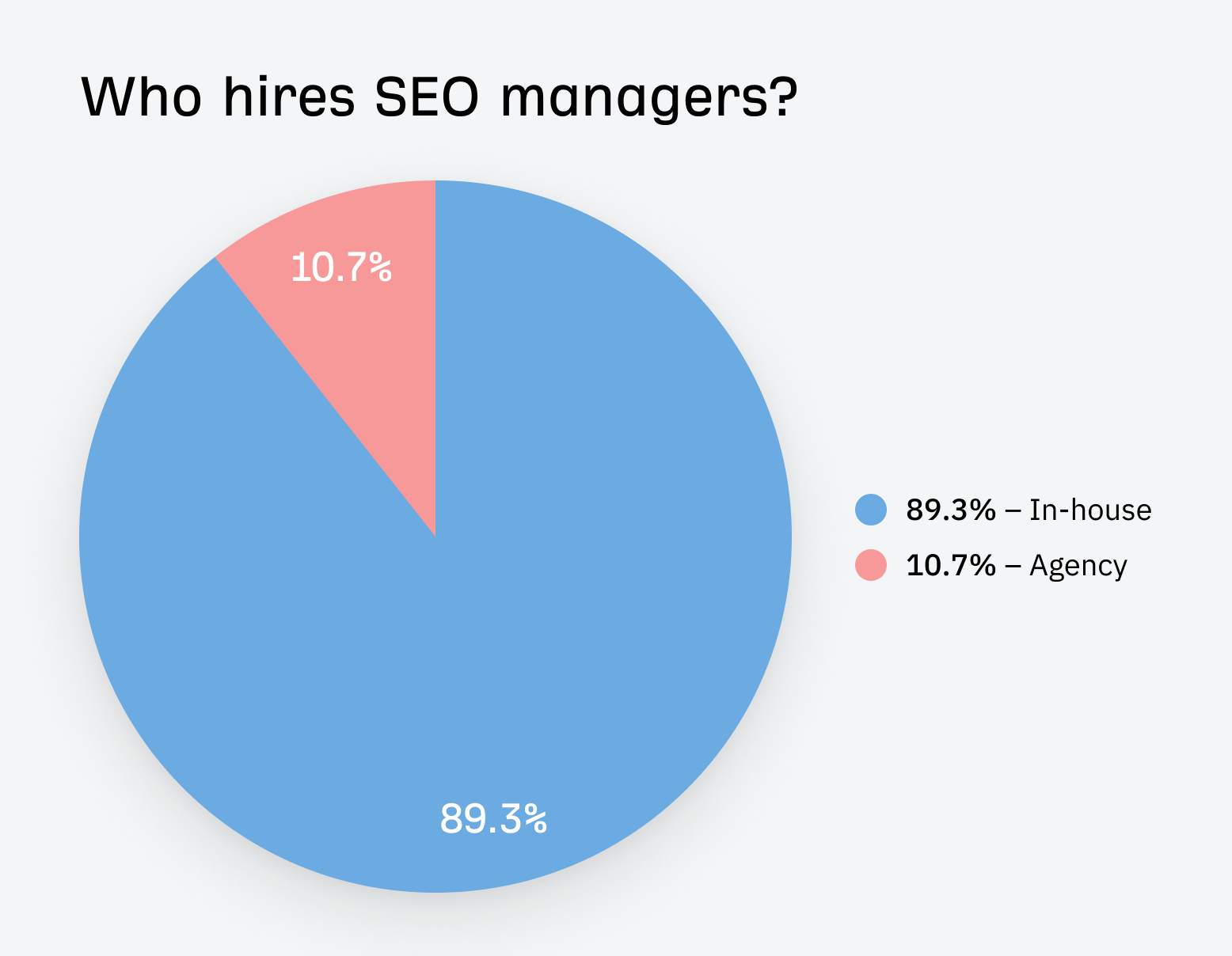
I’m actually not entirely sure why this is. My best guess is that SEO agencies aren’t always structured in a way that requires an “SEO manager.”
For example, here’s how SEO agency Bubblegum Search structures their team:
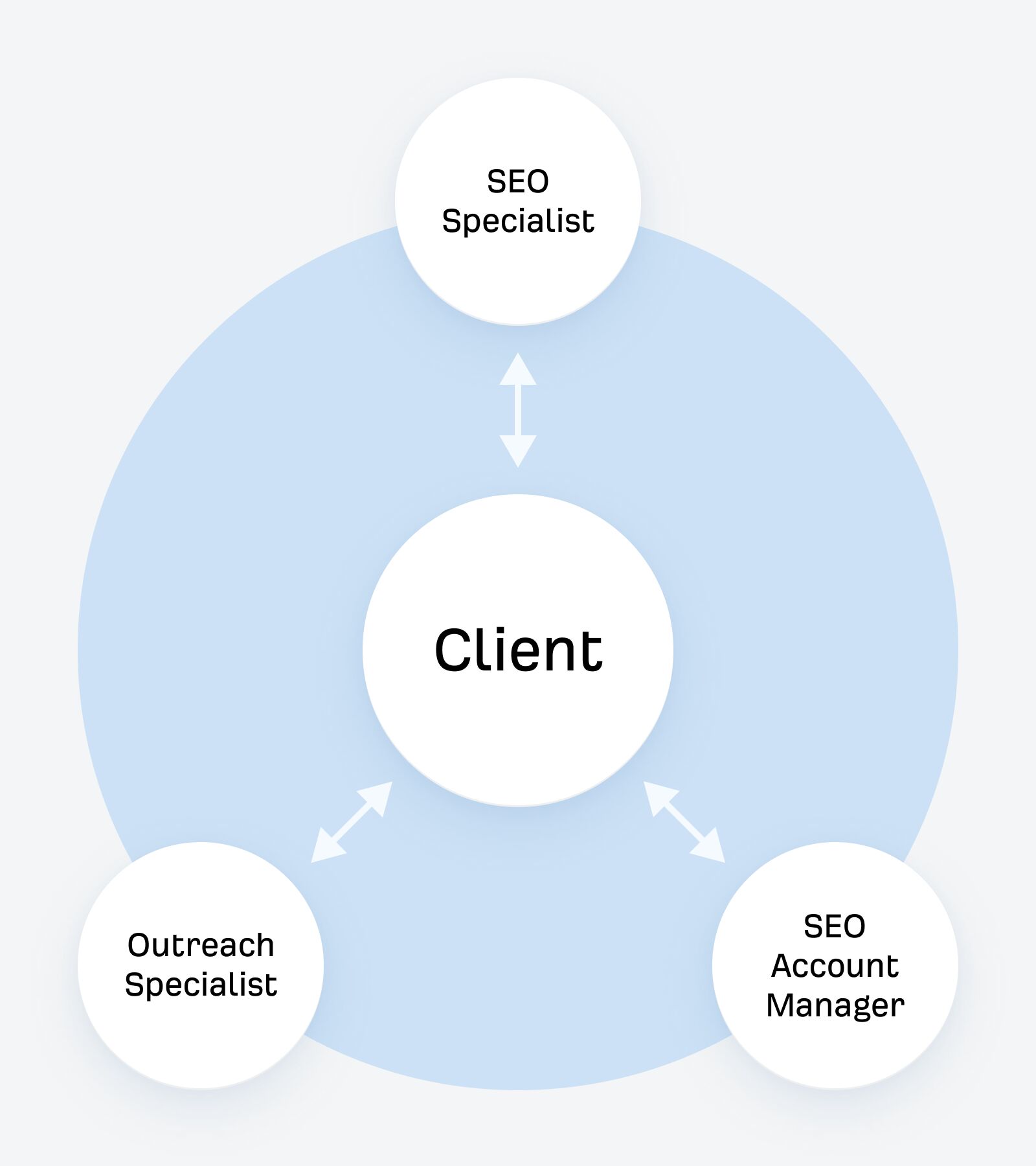
This is known as a pod structure and, as you can see, there’s no SEO manager in the picture.
Here’s their founder and director, Matt Cayless, explaining why they use this structure:
Each client is matched with a pod consisting of an account manager, an SEO specialist, and an outreach specialist. This ensures that the client receives a well-rounded service, with each member bringing their unique expertise to the table.
75.1% of US SEO managers make $100,000-$159,999. Roughly half of those make $120,000-$139,999.
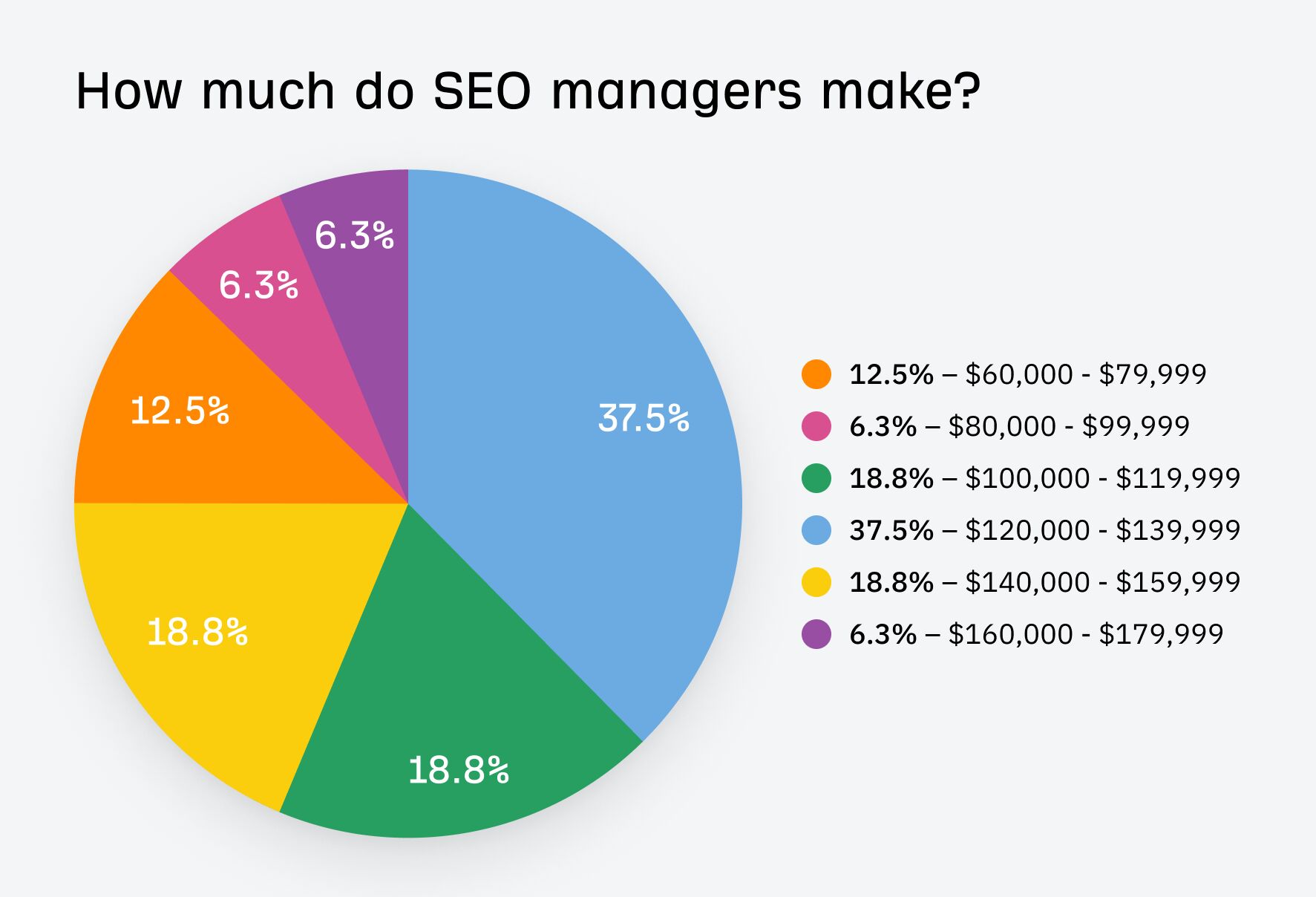
About the data
It was surprisingly difficult to get figures for this because the job listings gave a unique salary range rather than a single figure—some of which were huge!
For example, the salary range for this job is $111,000-$185,000:
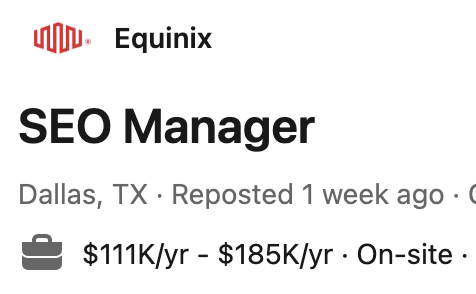
That’s a range of $74,000. Madness!
So, the data you see in the graph above is averages grouped into buckets. For example, if a job listing quoted a salary range of $100,000-$200,000, I took the average ($150,000) and grouped it into the appropriate bucket.
I thought it’d also be interesting to see how salaries varied by education and experience level, so I ran the data…
Education-wise, there’s virtually no benefit to having a degree. Positions requesting applicants have one pay just 1.77% more on average:
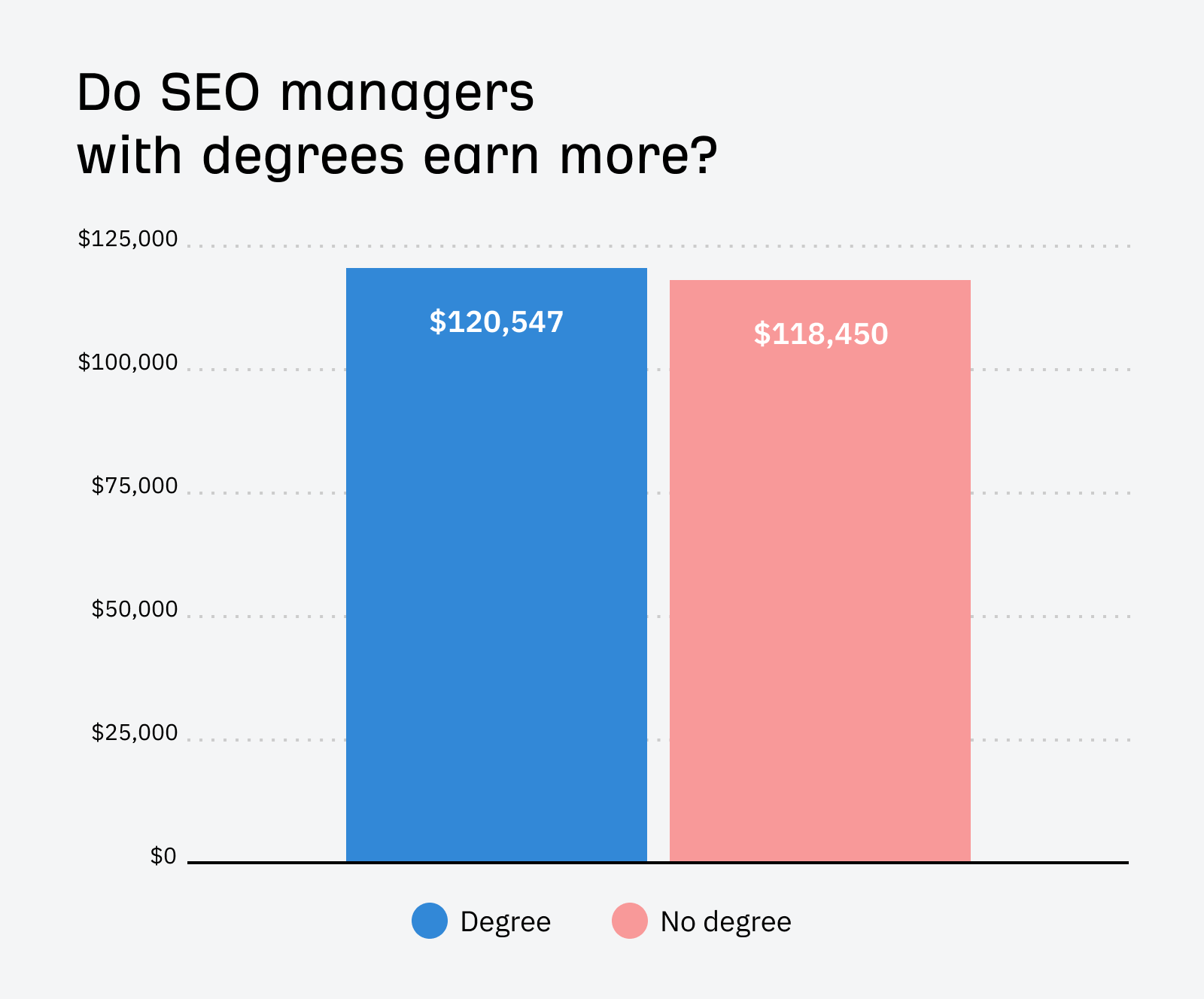
It’s a different picture when it comes to experience. Job listings asking for 2+ years of experience pay roughly $39,000 less than those asking for 4+ years:
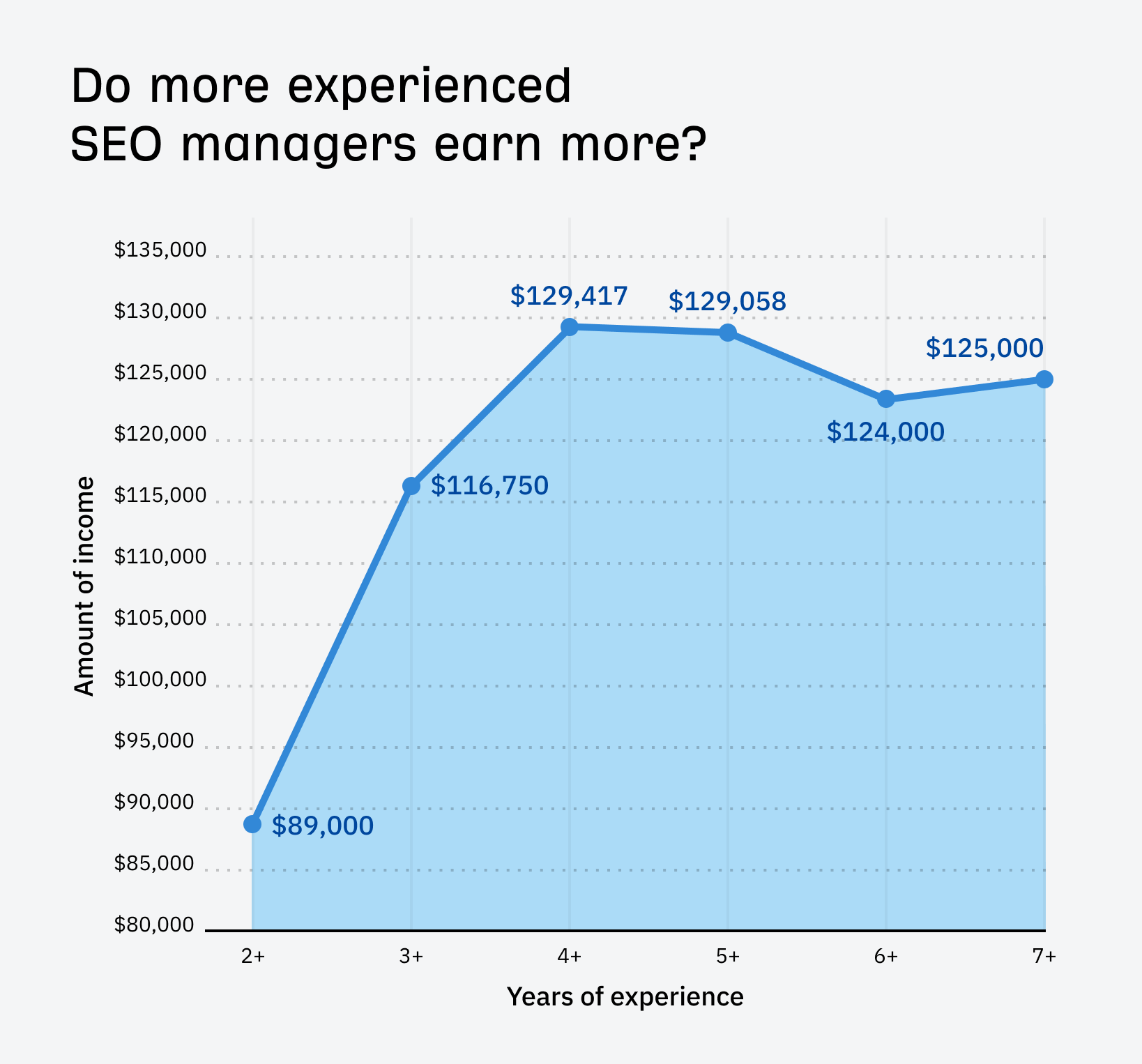
Salary growth tapers off after four years, with listings asking for 5+ years of experience paying roughly the same.
An SEO manager is far from an entry-level position. Every job listing I looked at asked for at least two years of experience, with the majority (54.2%) asking for at least five years.
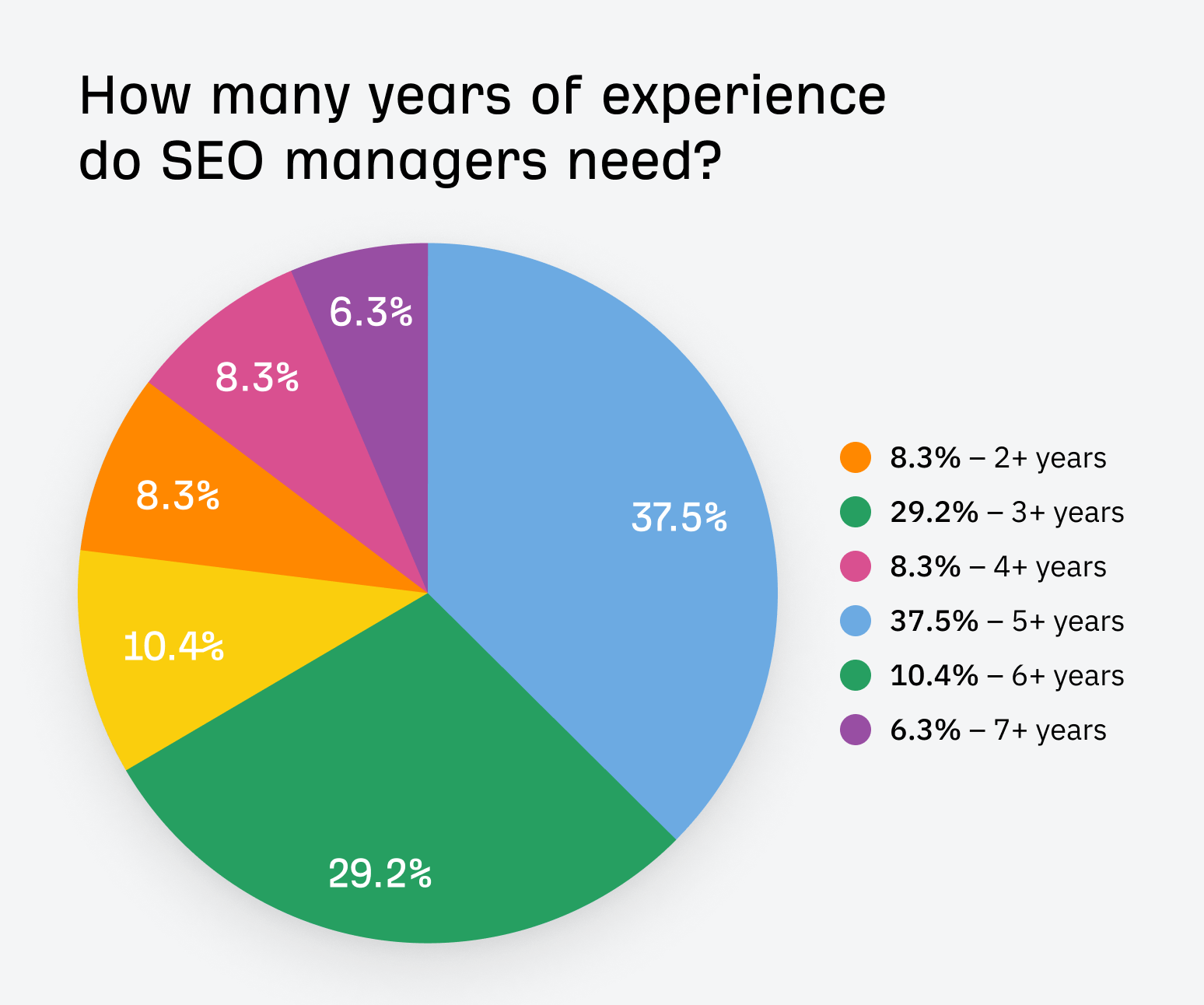
But how do you get that experience? What’s the path?
To answer this question, I checked the profiles of around 20 SEO managers’ profiles on LinkedIn and looked at their job history. Their paths were all individual and varied, but I noticed a definite trend that looked something like this:

With that in mind, here’s the path I’d suggest if you want to be an SEO manager:
1. Get an internship
60% of the SEO managers’ LinkedIn profiles I checked started out as interns.
I reached out to a few of these folks and asked if they’d recommend this as a starting point for aspiring SEO managers. All of them said yes.
Starting as an intern worked out great for me and is certainly a path I’d recommend. Coming out of school I had no idea what SEO was – I’d never heard the term and hadn’t even really considered how or why Google gives the results that it does! Going into an internship and starting “at the bottom” allowed me to build up my knowledge through working on small scale projects, with plenty of time for training and soaking up the overall “vibe” of the industry – and the amazing people within it.
I’d absolutely recommend this! I did my degree on the basis that there was a year in industry, and this is where I learned the absolute most about marketing throughout my time at university. It was also one of my first experiences in the type of workplace you can expect to be in the SEO industry, which taught me a lot.
Internships I undertook were crucial to my professional development. That’s where the real knowledge came from. Plus I got to make important connections with people in the industry.
Yes, for sure. As an intern you work on many different projects that help you shape your interests and the area you want to focus on after the internship is over.
To find internships, search LinkedIn, Indeed, or any other job site. It’s obviously best to get an SEO internship but if you can’t find one, a more generic digital marketing internship works. Most SEO managers I checked started out in such roles.
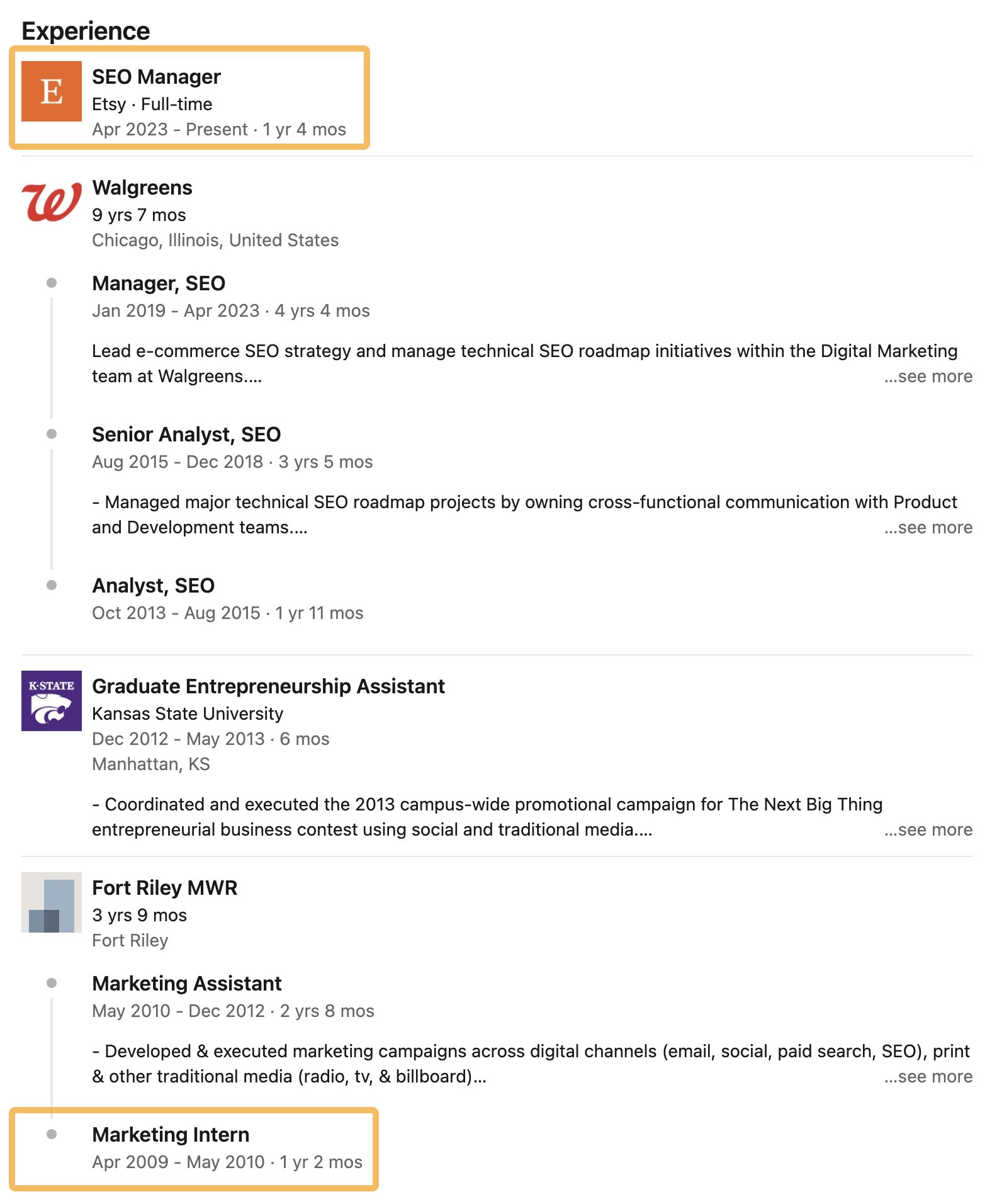
2. Become an SEO specialist
60% of the SEO managers’ LinkedIn profiles I checked were an SEO specialist at one point or another—often shortly after their internship.
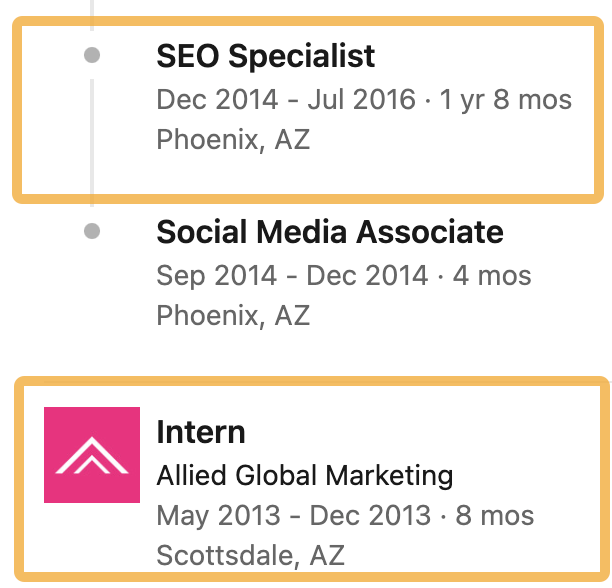
Learn more about the skills needed for this role in our analysis of SEO specialist job listings.
3. Progress through the ranks (and don’t be afraid to jump ship!)
It’s possible to go straight from SEO specialist to SEO manager, as proven by Andrew Chacon’s experience:

But most of the folks I analyzed on LinkedIn had a career progression with other roles in between. For example, Jonnathan Monsalve held SEO Team Lead and SEO Strategist positions between SEO Specialist and SEO Manager:
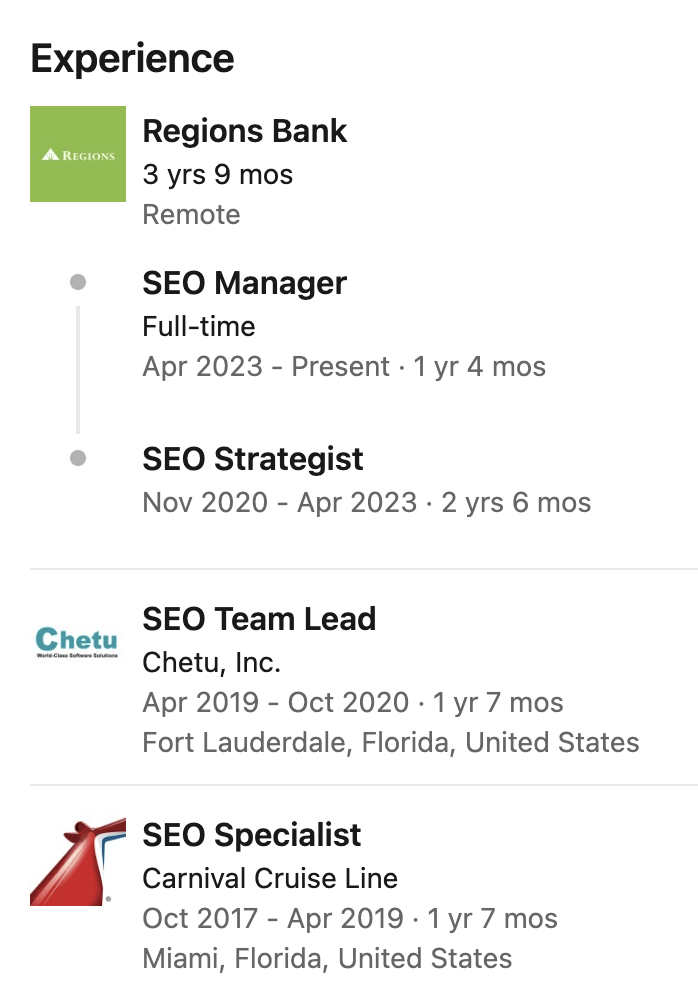
One thing I did notice, though: most people switched companies multiple times on their journey to SEO Manager—so don’t be afraid to do this too! If there’s no opportunity for progression within your current company, move!
I asked a few SEO managers how they see their careers progressing. Here are just a few of their answers.
Become an SEO lead or partner
Within my current position, I hope to continue to grow the SEO team and slowly build up from there looking to have a number of managers with seperate teams below, potentially moving into more of a lead / partner role.
Fraser wasn’t the only SEO manager to say this.
It’s basically the process of building more of an internal structure like the one below, which was featured in our guide to SEO team structures:

Become a freelancer
Three of the SEO managers I asked said that they’d like to do this in future or already are.
Outside of my current position, I do some freelance and consultant work, and doing this really supports me testing and identifying new opportunities that I can bring back into CreativeFolks and further test and measure across a wider number of clients. I would always recommend others to look at starting something on the side to allow them to further their skills and bring up new opportunities for themselves.
I found the answer above from Fraser really interesting: For him, freelancing isn’t really a career progress; it’s something he does alongside his current role that has the added benefit of helping him be a better SEO manager.
Become a marketing manager
I have a strong passion for product marketing. I have managed paid, email, programmatic, and social media marketing for other brands in the past. Therefore, I am excited about the prospect of working in product marketing or leading an entire marketing department in the future.
This seems like a pretty natural progression to me. It’s essentially going from managing one marketing channel to managing them all.
What next?
If you have no experience in the industry, an internship is definitely a good place to start. You might also want to set your sights on becoming an SEO specialist first. This is a common stepping stone in SEO managers’ career paths.
Find out what SEO specialists do here: I Analyzed 52 SEO Specialist Job Listings. Here’s What They Do and How You Can Become One











![How to Optimize for Google’s Featured Snippets [Updated for 2024]](https://moz.com/images/blog/Blog-OG-images/How-to-Optimize-for-Googles-Featured-Snippets-OG-Image.png?w=1200&h=630&q=82&auto=format&fit=crop&dm=1724004002&s=13df73104762982790dab6dc8328023f)


